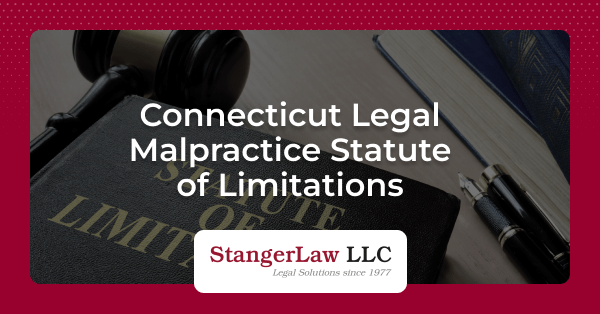Connecticut Legal Malpractice Statute of Limitations

The majority of attorneys do their best to meet your expectations and serve your needs, but there are some that make mistakes in representing you.
If that happens, you may have a case for legal malpractice, where you can recover compensation for the losses you suffer due to misconduct.
However, there are many legal requirements for bringing a cause of action against your lawyer and one of them is a time restriction known as the statute of limitations.
Under the Connecticut legal malpractice statute of limitations, you must file a lawsuit against a party within a specific period of time. If you miss this deadline, you are forever barred from pursuing that individual or entity for compensation.
Because legal malpractice claims involve many complexities, you should discuss your situation with an experienced Connecticut legal malpractice attorney. The answers to some common questions below may also help.
Please don’t hesitate to contact us online or call (860) 561-0651 today for a consultation.
Our Practice is Limited to Connecticut
We handle Connecticut legal malpractice claims. We won’t review cases where financial losses are less than $100,000.
What is Connecticut’s Statute of Limitations on Legal Malpractice?

The state law restricting the amount of time you have to file a malpractice lawsuit falls under the general tort statute of limitations in Connecticut.
You have three years from the date of the alleged misconduct to initiate litigation. There are certain exceptions that extend this statute of limitations, but they are limited in scope.
It is wise to take action quickly and avoid delays, so there are no issues with your claim as this legal malpractice deadline approaches.
Are There Other Factors Involved With a Legal Malpractice Claim?
In addition to complying with the legal malpractice statute of limitations in Connecticut, you must prove the required elements of a legal malpractice case in order to succeed on your claim.
You must establish the following:
- That the attorney failed to exercise his or her duty to represent you with the care, skill, and diligence that other lawyers in the same position would have, and that breach of this duty constitutes negligence that was a proximate cause of your losses;
- You did actually suffer losses as a result of the breach of duty; and,
- You would have prevailed in a case or avoided negative consequences were it not for the attorney’s negligence.
What Kind of Actions Rise to the Level of Legal Malpractice?
Not all mistakes amount to the sort of negligence that allows you to recover in a legal malpractice lawsuit.
Some actionable legal malpractice examples include:
- Your lawyer missed a critical deadline;
- The attorney engaged in sexual misconduct:
- There was co-mingling of your funds with another client’s;
- A failure to communicate, especially when the lawyer agrees to something on your behalf.
Contact an Experienced Connecticut Legal Malpractice Attorney About Your Case
The statute of limitations is just one factor involved with legal malpractice cases, and these matters also involve many other complicated laws and procedural rules. If you have questions or want to know more about your legal options, please contact StangerLaw LLC right away by sending an online message or calling (860) 561-0651.
Our professional malpractice lawyers have represented many clients throughout Connecticut, and we can help you recover compensation for your losses.